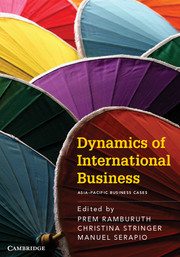Book contents
- Frontmatter
- Dedication
- Foreword
- Contents
- Contributors
- Preface
- Part I The Environment of International Business
- Part II Strategy and Entrepreneurship in International Business
- Part III Managing People in International Business
- 13 John Parker’s expatriate experiences in China
- 14 Dilemmas in working across cultures: Arun in a conundrum
- 15 Working in Chinese firms
- 16 Losing touch with the context: The story of Ravinaki Resort in Fiji
- 17 Foxconn: The complexity of quality control in a Chinese context
- 18 Quality through culture: Organisational development at New American Ice Cream
- Part IV Operating in International Markets
- References
13 - John Parker’s expatriate experiences in China
Published online by Cambridge University Press: 05 August 2013
- Frontmatter
- Dedication
- Foreword
- Contents
- Contributors
- Preface
- Part I The Environment of International Business
- Part II Strategy and Entrepreneurship in International Business
- Part III Managing People in International Business
- 13 John Parker’s expatriate experiences in China
- 14 Dilemmas in working across cultures: Arun in a conundrum
- 15 Working in Chinese firms
- 16 Losing touch with the context: The story of Ravinaki Resort in Fiji
- 17 Foxconn: The complexity of quality control in a Chinese context
- 18 Quality through culture: Organisational development at New American Ice Cream
- Part IV Operating in International Markets
- References
Summary
John Parker
Sitting in his office on the 14th floor in Beijing’s CBD, John Parker was reflecting on his experience during the last year and wondering where things had gone wrong. He had been a successful manager in DigiMat, a United States-based company with subsidiaries in Asia and Europe, and one year earlier he had been assigned as the Asia Pacific Sales Director. His job required him to spend about half of his time based in China, with the rest of it to be spent mainly between Singapore and Australia. With his 15 years of experience in the IT industry, an MBA and a sound educational background, and his outstanding performance as a manager in North America, he had a great deal of confidence when he first took on his new assignment. He had been looking forward to moving to China, a country with a unique cultural environment that he had long admired but had never visited.
Back in the United States, before his departure, the headquarters had given him a two day cross-cultural training session to prepare him for his new venture. The session provided him with a brief introduction to Asian culture and showed him how to best handle the expected culture shocks that accompany working in a different environment. The training had reminded him of the cross-cultural management course that he completed during his MBA program a few years before; he still remembered the concepts provided by Hofstede’s (1991) cultural dimensions and Hall’s (1976) cultural context theories. This culture-related knowledge, together with his strong industry and management background, boosted his confidence, and John believed that he was totally ready for the new job. It would be an exciting experience, he told himself, before he headed to China.
- Type
- Chapter
- Information
- Dynamics of International Business: Asia-Pacific Business Cases , pp. 137 - 144Publisher: Cambridge University PressPrint publication year: 2013

